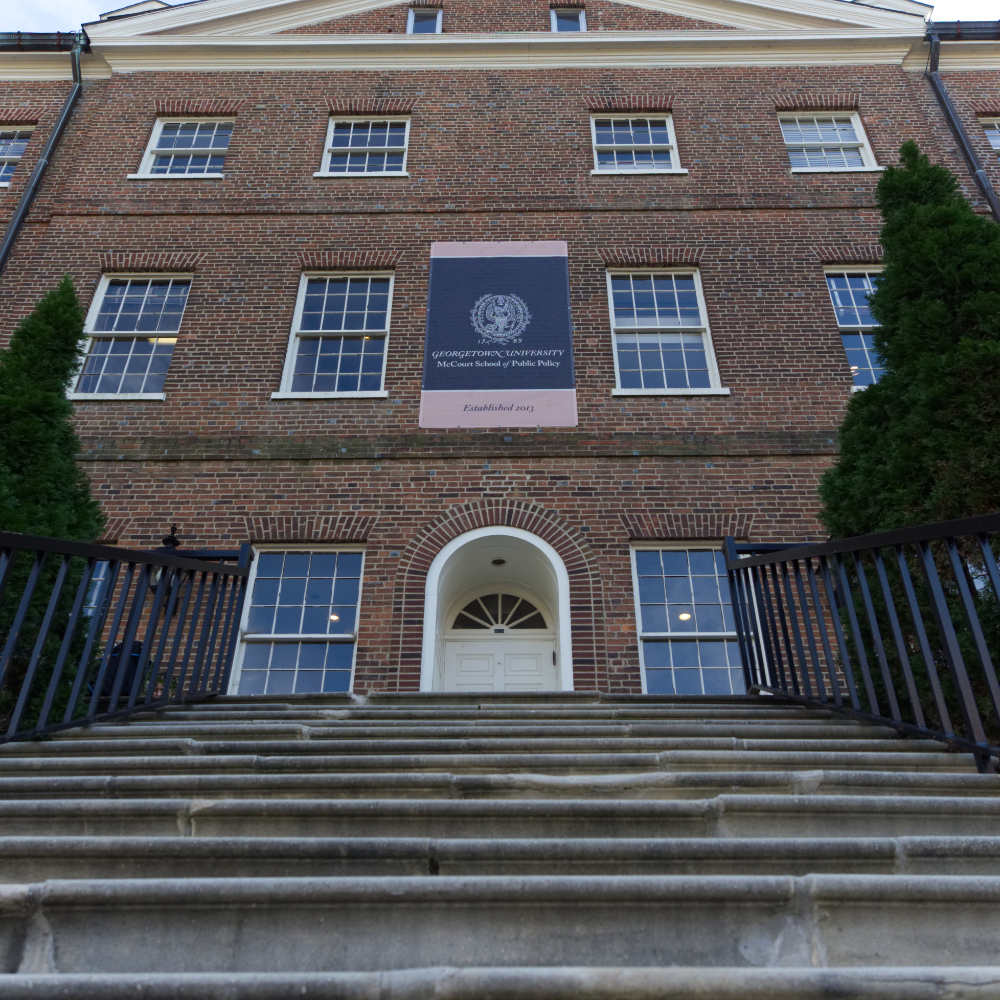The American public should expect election interference from both foreign and domestic actors in the 2020 U.S. presidential election but should not be discouraged from voting, panelists said at a conversation with the Georgetown Institute of Politics and Public Service moderated by Executive Director Mo Elleithee (SFS ’94).
GU Politics hosted the Oct. 9 event, “Protecting Democracy: A Conversation on Election Integrity with Former DHS Secretaries,” which featured two former Secretaries of Homeland Security: Michael Chertoff, who served under President George W. Bush from 2005 to 2009, and Jeh Johnson, who served under President Barack Obama from 2013 to 2017.
The panelists said although misinformation and voter manipulation online pose a real problem, voters can be confident in the United States’ electoral process and that their votes will count.

Given the structure of the U.S. election process, Johnson said the biggest threats to the integrity of the election could be classified into three main categories: a cyberattack on election infrastructure, the weaponization of stolen cyber information and the spread of disinformation and misinformation.
“A national election result can be altered by upsetting the voting in just a few key precincts in a few key states,” Johnson said. “That is not necessarily a cyber vulnerability; there are things one could do, or have attempted in the past to do, to suppress particular precincts.”
In 2016, the Russian government hacked into and stole information from the Democratic National Committee. It is believed the Russian government weaponized the stolen information to influence the results of the election. Although this was not the first time a foreign actor hacked a campaign, it was the first time the information was deployed to assert influence over voters.
Russia is not the only country believed to have meddled in U.S. elections. China and Iran have also been known to involve themselves in some of the same ways Russia did in the 2016 U.S. elections.
The federal government must be proactive in establishing deterrents against foreign interference in future elections, according to Johnson.
“I believe, at some point, our government will create sufficient deterrents so that foreign governments discontinue the bad behavior and move on to something else,” Johnson said. “Don’t plan for the last attack, plan for the next attack.”
Although foreign interference was a main culprit of election meddling in the 2016 election and will continue to pose a threat, Chertoff warned domestic interference is just as serious this election season.
“Much of the most inflammatory content is domestically generated,” Chertoff said. “All that Russians do is sit back and watch and pick the things they think are the most outrageous.”
Social media has become a gateway for the spread of misinformation and disinformation among the public. Recently, Twitter and Facebook have taken measures to limit their role in the advance of fake news. Twitter decided to make changes to the ability of politicians and others to retweet fake information, and Facebook announced they will not allow any political ads in the week leading up to the presidential election.
Johnson agreed most distribution of interference in U.S. elections comes from domestic content and said some of the responsibility to keep elections fair is on the shoulders of the American public.
“The public has a role to play here. The public has to accept responsibility for discerning some of the junk they consume and recognizing it as such,” Johnson said. “And if we do that, then we go a long way from insulating ourselves from this type of threat and this type of vulnerability.”
The difficulty that comes with content moderation is discerning where freedom of speech crosses the line into the manipulation of eligible voters. According to Chertoff, social media does not bear all of the responsibility when it comes to regulating misinformation. Other media, including news radio or broadcast television, must moderate their own content too.
“We need to have professionalism restored to mainstream media,” Chertoff said. “The truth is, many people get the most misleading disinformation from turning on their favorite cable news channel.”
The panelists agreed fears about voter fraud are overblown because it would be difficult for fraud to affect a large-scale election. Johnson and Chertoff also said no eligible U.S. citizen should be deterred from voting this election cycle.
“It should not discourage anyone from participating in our democracy,” Johnson said. “I believe that there is a civic obligation among voters, among those eligible to vote, to be smart about their vote, and to pierce through the disinformation out there on social media and be a smart voter.”




















